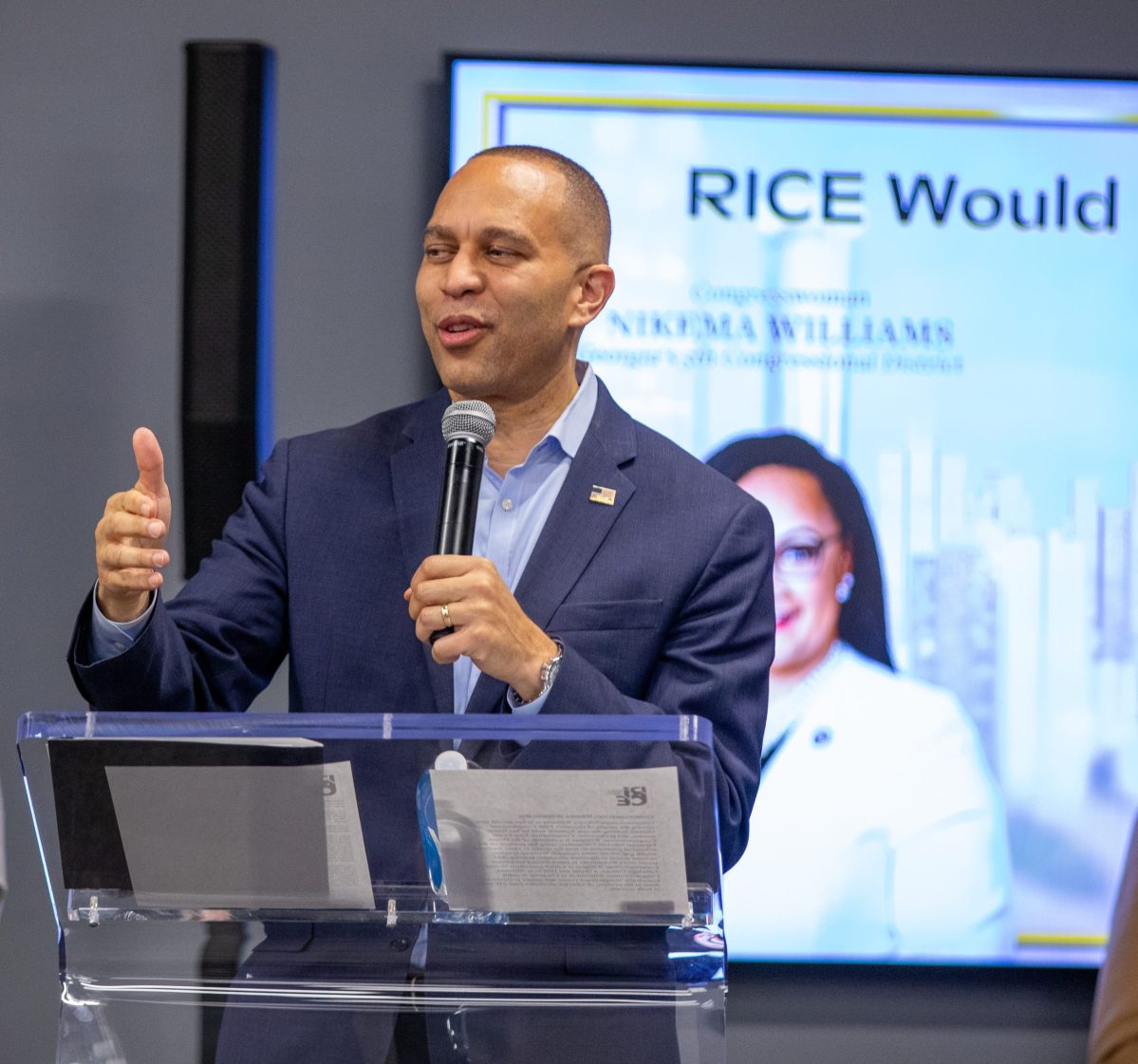On Tuesday, Jan. 2, U.S. Congresswoman Nikema Williams told the Russell Center she’d be hosting a guest here in Atlanta and would like to visit the campus. Her guest would be the U.S. House Minority Leader Hakeem Jeffries. Two days later, Jeffries and Williams would visit the Russell Innovation Center for Entrepreneurs. They were joined by Georgia State Representative Inga Willis, a Democrat from Atlanta. Leading the tour was the President and CEO of the Russell Center, Jay Bailey.
During the tour, Jeffries learned the Russell Center recently took their cadre of entrepreneurs based in their incubation center to Colombia to drive economic development in Afro-Caribbean communities. He also discovered the ways which RICE has been able to leverage partnerships with companies such as Mastercard, Wells Fargo, Wal-Mart and more in order to drive more than $600 million in investment directed towards Black entrepreneurs under their stewardship.
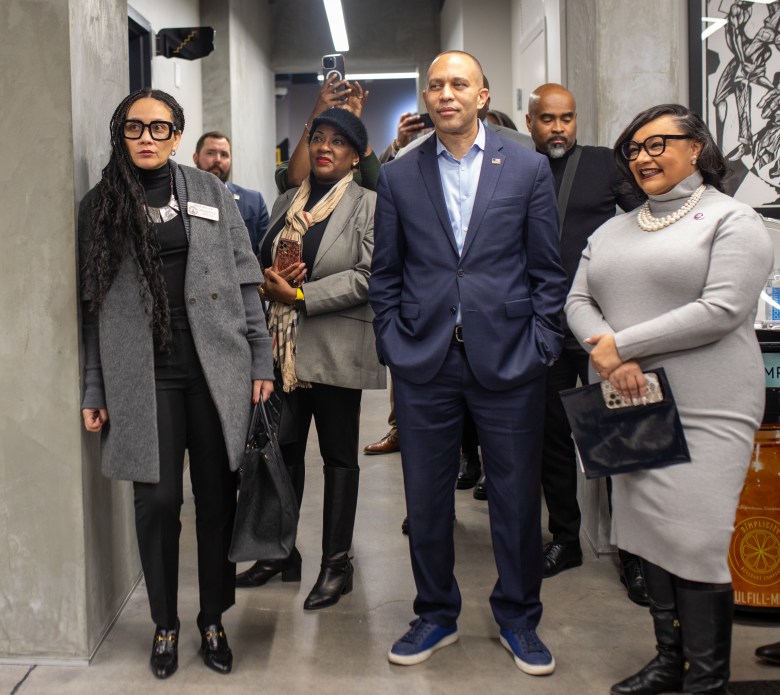
Jeffries came away impressed with the Russell Center’s high and comprehensive level of providing services and resources to Black-owned businesses and Black entrepreneurs in every stage of a business’s life cycle. But it’s nothing new to the City of Atlanta.
With Atlanta’s first Black mayor, Maynard Holbrook Jackson, Jr. and the trailblazing businessman, Herman J. Russell, is a through line over the last 50 years of Black leadership in the public and private sectors. Jeffries was asked if the federal government could take what is done here, and replicate this in cities like Chicago, Charlotte, Nashville, Memphis and elsewhere?
“There’s been a real commitment, led by President Biden and vice president Harris, to lean into the growth and development of Black entrepreneurship and economic opportunity,” Jeffries said. “And in many ways, the model and the example here at the Russell Innovation Center for Entrepreneurs, is one that should be capable of being emulated and replicated so that the growth and opportunity that we will continue to see here in Atlanta isn’t limited just to this part of the country, but can be built out in other parts of the country.
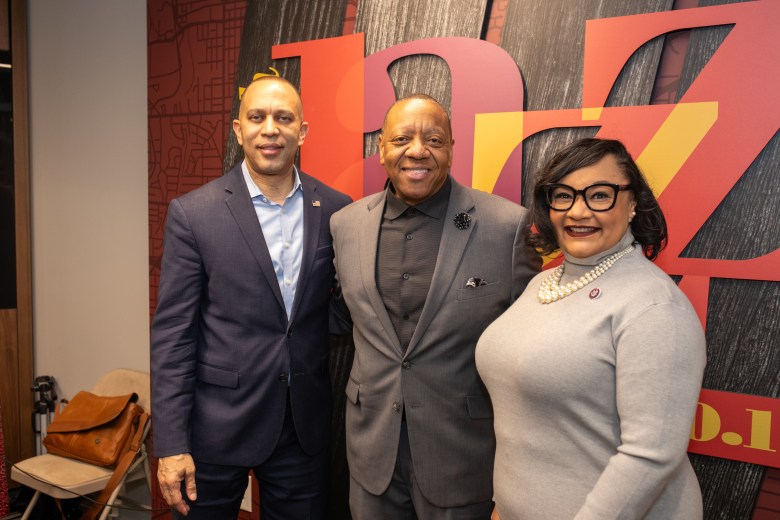
One of the things I said to Jay, was that I’m looking forward to try to connect some of the leaders of New York City including Mayor [Eric] Adams, who has a vision of trying to conduct himself in a manner similar to former mayor Maynard Jackson and to experience what is being done here in Atlanta, through RICE, as a way of perhaps bringing Mayor Adams his vision to life in New York City.”
Jeffries also said during his speech to the assembled stakeholders at RICE when Black businesses succeed, America succeeds. According to a study conducted by Pew Research, majority Black American-owned businesses made up the greatest share of all classifiable firms in the District of Columbia, Georgia and Maryland. Additionally, Nearly six-in-ten Black adults (58%) say supporting Black businesses, or “buying Black,” is an extremely or very effective strategy for moving Black people toward equality in the United States.
Additionally, There were an estimated 161,031 Black or African American-owned businesses with $183.3 billion in annual receipts, 1.4 million employees, and about $53.6 billion in annual payroll, according to the 2022 Annual Business Survey (ABS), which referenced data collected in 2021.
Congresswoman Williams added it’s part of her responsibility to help continue the legacy established by Maynard Jackson and H.J. Russell: uplifting what the Russell Center is doing so that it’s not just held here in Atlanta or in the southeast. She characterized it as a national vision that can be exported around the world.
“Mr. Russell opened up so many doors for so many people and so I have an obligation to continue to open those doors for businesses,” Williams said. “We brought the Department of Commerce here, the Secretary of Commerce, to present grants that we’re for local businesses. We’re not just [attracting] Black businesses [to present those grants]. But this has been on a national scale, what Jay has been able to do here. And I’m just looking forward to what’s next, how we continue to partner with my work in Congress, but the work that RICE is doing right here on the ground. So any opportunity that I have to show off your leadership, the leadership of the entrepreneurs who depend on what we’re doing here, every day. You can always count on me.”
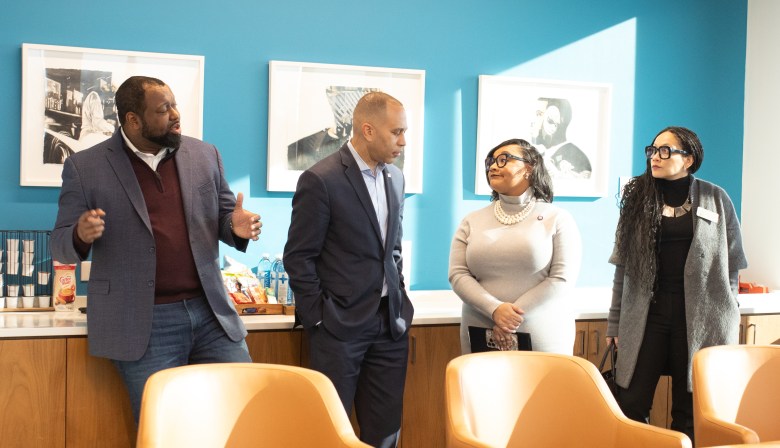
Recently, Rep. Williams introduced legislation that would create a grant program with the Small Business Administration for entrepreneurs at minority-serving institutions such as Historically Black Colleges and Universities. Minority Entrepreneurship Grant Program Act, aims to meet the needs of this moment in which we find Diversity, Equity and Inclusion initiatives get demonized by those on the right.
“When Leader Jeffries took over, he said, from day one, that we will work with Republicans. This is bipartisan legislation, we will work with anyone who is ready and willing to do the work for the people. And that’s what we’re doing with this legislation. I’m a third generation HBCU alum, shoutout to Talladega College. And so doing it at minority serving institutions and HBCUs was important to me, but it’s about serving the people. And we are willing to do that with anyone, any party, who is willing to step up and lead.”
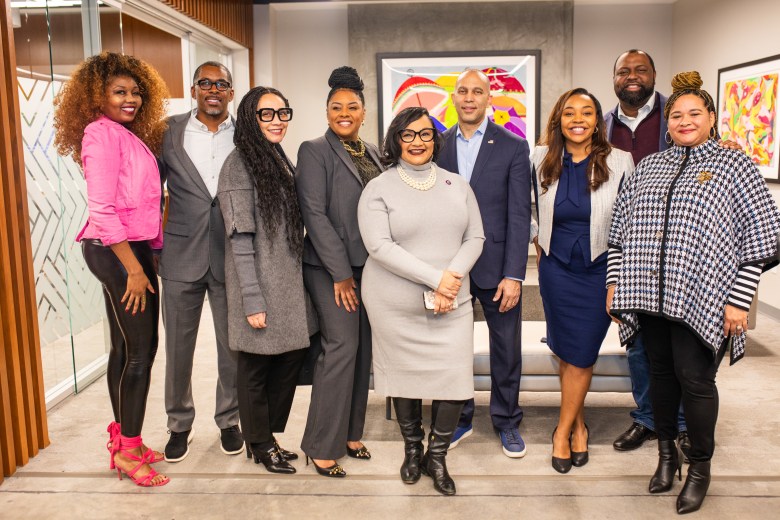
As Congress gavels back in this week, Jeffries came away from his visit to the Russell Center overwhelmingly assured that RICE has every available resource presented to these entrepreneurs, who if given the opportunity, and the access, can develop thriving businesses. However, he said it’s not the case across the nation. Jeffries reiterated the work at the Russell Center can be replicated nationwide.
“At the end of the day, when that occurs, you’ll see magic from a business standpoint, Blossom all across the country,” Jeffries exclaimed. “One of the things that, to me, is magical about the Russell Innovation Center for entrepreneurs is the commitment to community transformation, which is a very powerful model that should be replicated all across the country.”

